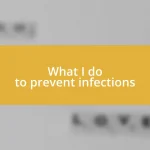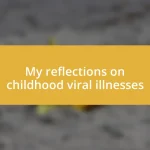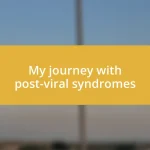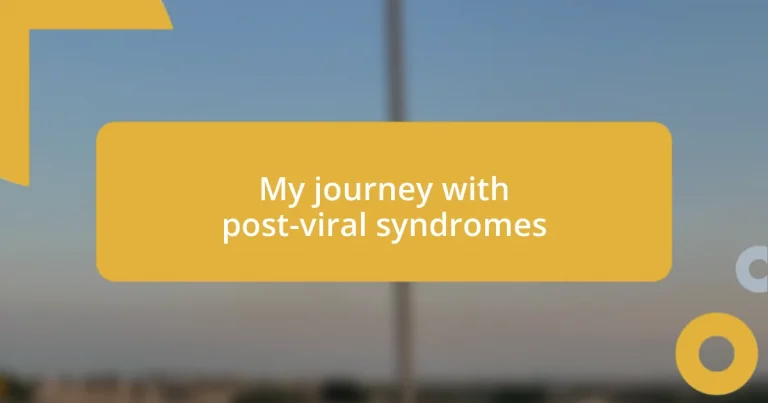Key takeaways:
- Post-viral syndromes can cause a range of lingering symptoms such as fatigue, brain fog, and emotional distress, making recovery challenging.
- Implementing coping strategies like breaking tasks into smaller steps, practicing mindfulness, and establishing a daily routine significantly aids in managing symptoms and promoting recovery.
- Seeking medical support and building a supportive community are crucial for emotional well-being, helping individuals feel understood and less isolated in their recovery journey.
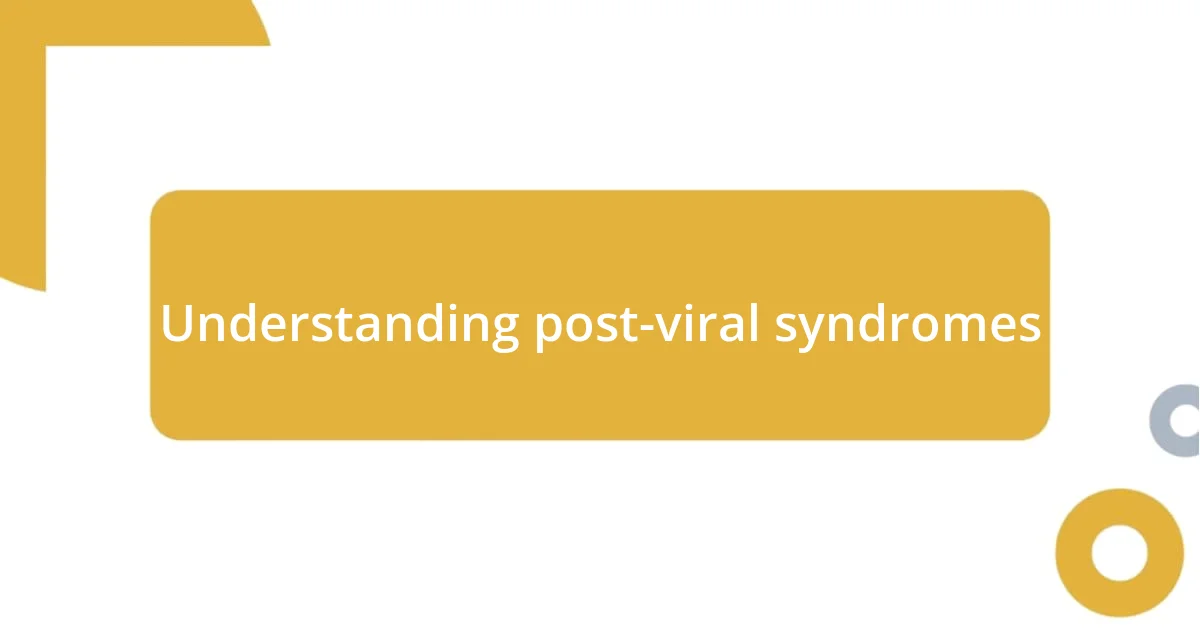
Understanding post-viral syndromes
When I first encountered post-viral syndrome, I was struck by how elusive it can feel. You might have gone through a tough illness, emerged feeling good, and then suddenly found yourself grappling with fatigue, brain fog, and lingering aches. It leads me to wonder, how can something that seems to have passed still hang around like an uninvited guest?
This condition often doesn’t fit neatly into the typical diagnosis box. For me, it was almost disorienting to be told everything physically appeared normal, while I was battling this invisible force. Have you ever felt like your body was betraying you, even when tests say otherwise? That’s the reality for many experiencing post-viral syndromes, where symptoms can linger for weeks or even months after the initial infection has cleared.
Understanding post-viral syndromes means acknowledging not just the physical toll but also the emotional weight they carry. I remember days where my mind was sharper than my body could handle, leading to a frustrating disconnect. This unique blend of physical exhaustion and emotional strain makes it essential to find a support network, as sharing your experience can be incredibly validating and reassuring.
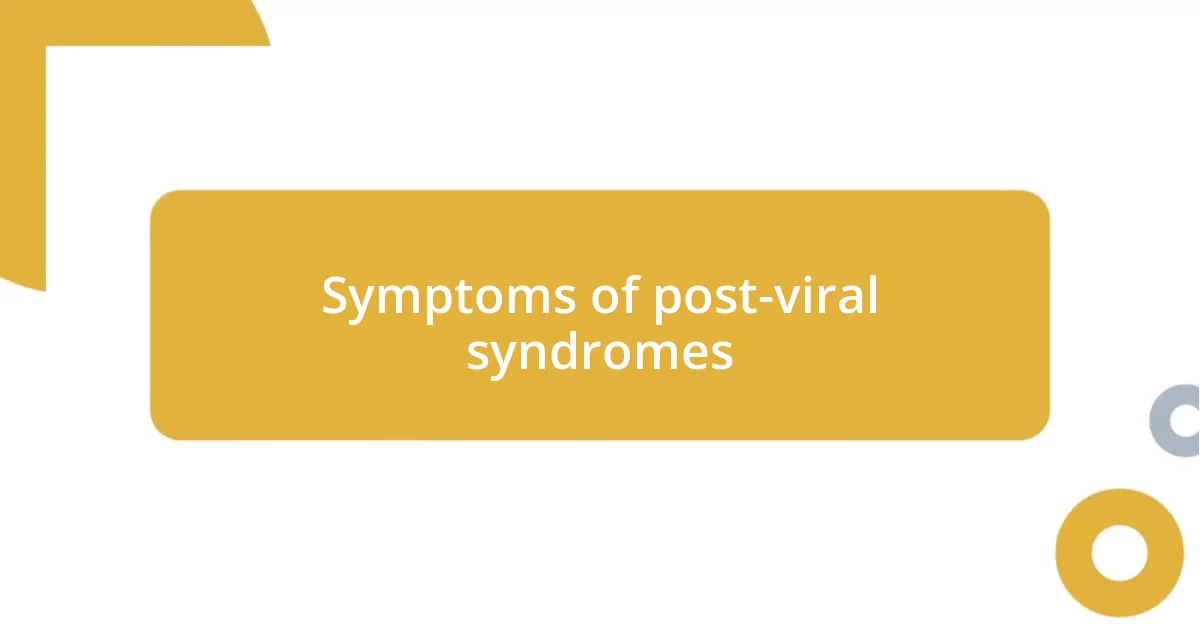
Symptoms of post-viral syndromes
It was surprising to realize how diverse the symptoms of post-viral syndromes can be. While fatigue is often the most talked about, I found that brain fog could feel equally debilitating, making it tough to focus even on the simplest tasks. My experience taught me that paying attention to these symptoms is crucial for managing their impact on daily life.
Here’s a glimpse of the common symptoms one might face:
- Fatigue: Persistent tiredness that doesn’t ease with rest.
- Brain fog: Difficulty concentrating or recalling information, often accompanied by confusion.
- Muscle and joint pain: Unexplained aches that can shift from one area to another.
- Sleep disturbances: Insomnia or unrefreshing sleep that leaves you feeling drained.
- Headaches: Tension-like or migrainous headaches that can disrupt daily activities.
- Palpitations: An increased awareness of your heartbeat, sometimes feeling irregular.
- Sensitivity to light and sound: An overwhelming discomfort in environments that were once fine.
At times, I found myself overwhelmed by a sudden wave of anxiety during seemingly normal moments, heightening the chaos of my experience. It felt like my body was sending a continuous distress signal, and I had to learn to navigate these symptoms effectively to maintain some semblance of normalcy in my life.
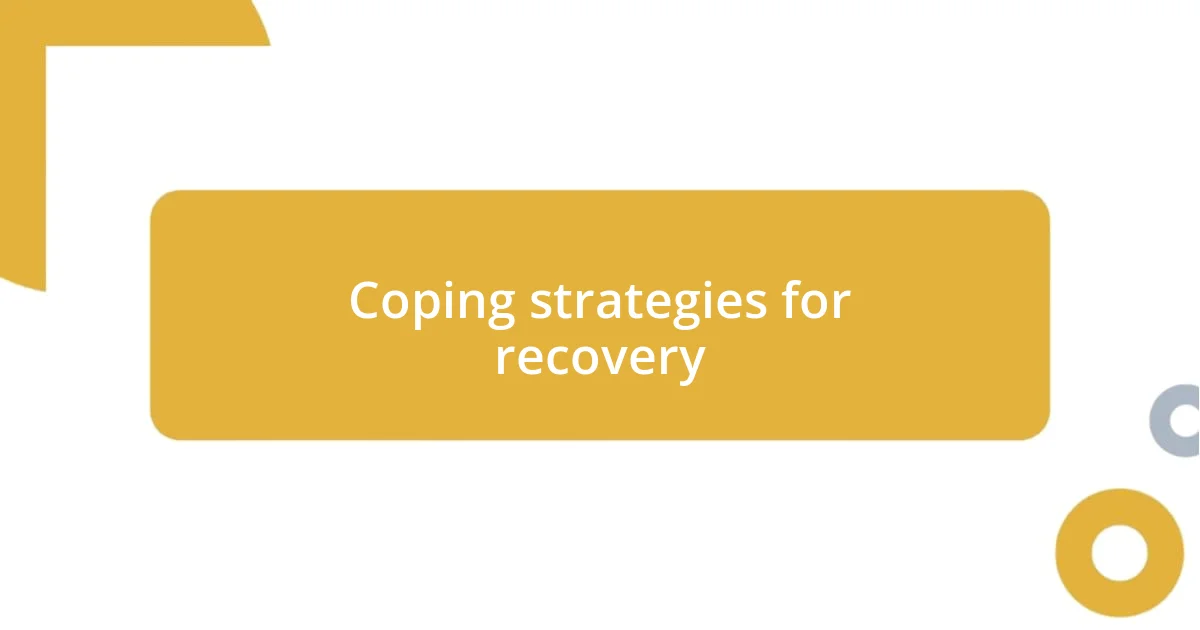
Coping strategies for recovery
Finding effective coping strategies for recovery has been essential in my journey with post-viral syndromes. When I first started experiencing the lingering effects, it felt overwhelming. I quickly realized the importance of breaking tasks into smaller, manageable steps. For instance, rather than aiming to clean the entire house in one go, I would set a goal to tidy just one room. This approach really helped me maintain a sense of accomplishment without overexerting myself.
One coping strategy that stood out for me was the practice of mindfulness. Initially, I approached it with skepticism, thinking it wouldn’t be able to help alleviate physical symptoms. However, dedicating just a few minutes each day to deep breathing and guided meditation allowed me to create a mental space where I could alleviate stress and anxiety. It felt like a mini-vacation for my mind during a time when my body didn’t cooperate as I wanted.
I’ve also found that establishing a consistent daily routine plays a significant role in my recovery. On days when my symptoms spike, sticking to a rhythm helps ground me. I incorporate gentle stretches, balanced meals, and ample rest into my day. This focused approach not only makes me feel more in control but also allows me to listen to my body and respond to its needs. How has establishing a routine made a difference for you in managing symptoms?
| Coping Strategy | Benefits |
|---|---|
| Breaking Tasks into Smaller Steps | Reduces overwhelm and provides a sense of accomplishment. |
| Mindfulness Practices | Helps to alleviate stress and enhances mental clarity. |
| Establishing a Routine | Creates structure and allows for better symptom management. |
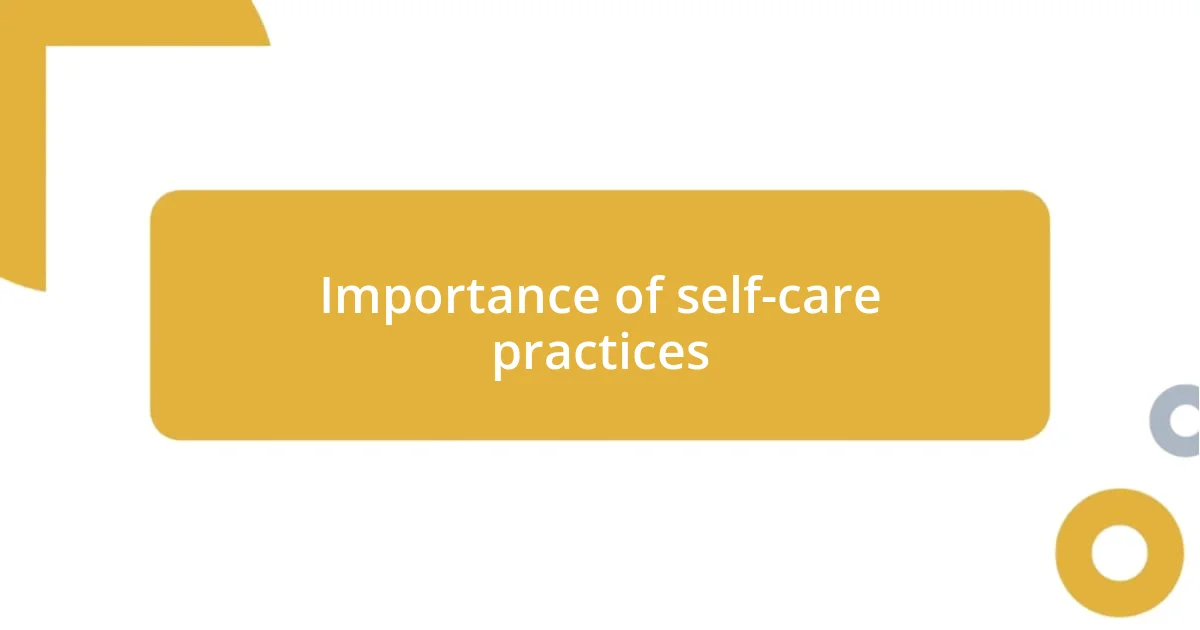
Importance of self-care practices
Self-care practices are non-negotiable when navigating post-viral syndromes. I discovered this firsthand after spending weeks pushing through fatigue, thinking I could simply “will” myself back to normal. It wasn’t until I set aside moments for self-care that I truly recognized the breath of fresh air it brought to my daily routine. Whether it was enjoying a warm bath or indulging in a light-hearted book, these small acts reminded me that it was okay to pause.
Reflecting on my experience, I realized how powerful self-care can be in fostering mental well-being. After a particularly exhausting day, I made a commitment to spend time outdoors, watching the leaves dance in the wind. This brief interaction with nature shifted my perspective and helped me manage anxiety. The simple question kept popping up in my mind: Could just five minutes outside change everything? To my surprise, it genuinely did.
Moreover, establishing boundaries was another essential aspect of self-care that I learned to value. Initially, I felt guilty saying no to social engagements, yet prioritizing my health became paramount. When I did choose to rest instead of going out, I felt an overwhelming sense of relief wash over me. I began to understand that taking care of myself wasn’t just beneficial; it was necessary for my overall recovery. Isn’t it incredible how prioritizing our well-being can reshape not just our health, but our entire outlook on life?
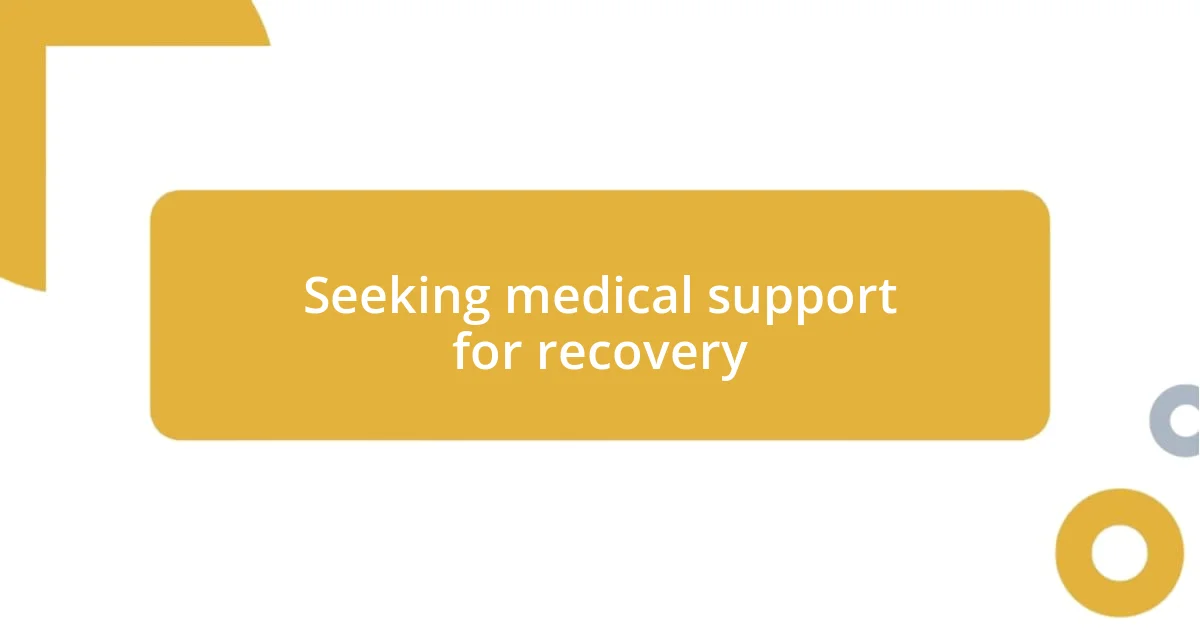
Seeking medical support for recovery
Seeking medical support during my recovery journey was a pivotal step. Initially, I hesitated to consult a healthcare professional, feeling uncertain about whether my symptoms warranted a visit. However, once I reached out, I realized the power of having an expert on my side. It was comforting to discuss my experiences with someone who understood the complexities of post-viral syndromes.
During my visits, I found that open communication with my doctors made a significant difference. I learned to share my feelings honestly, describing every aspect of my struggle, from fatigue to mood swings. What surprised me was how much they appreciated my insights. Their supportive responses helped me feel validated and understood, reinforcing that I wasn’t alone in this battle.
Therapeutic interventions, like cognitive behavioral therapy, became transformative for me. I remember one session where I could finally voice the frustration I felt about my limitations. My therapist introduced me to coping strategies that changed my perspective, allowing me to view my recovery as a journey rather than a destination. Have you ever considered how professional support could reshape your approach to recovery? I genuinely believe that seeking help not only alleviated my symptoms but also empowered me to reclaim my life.
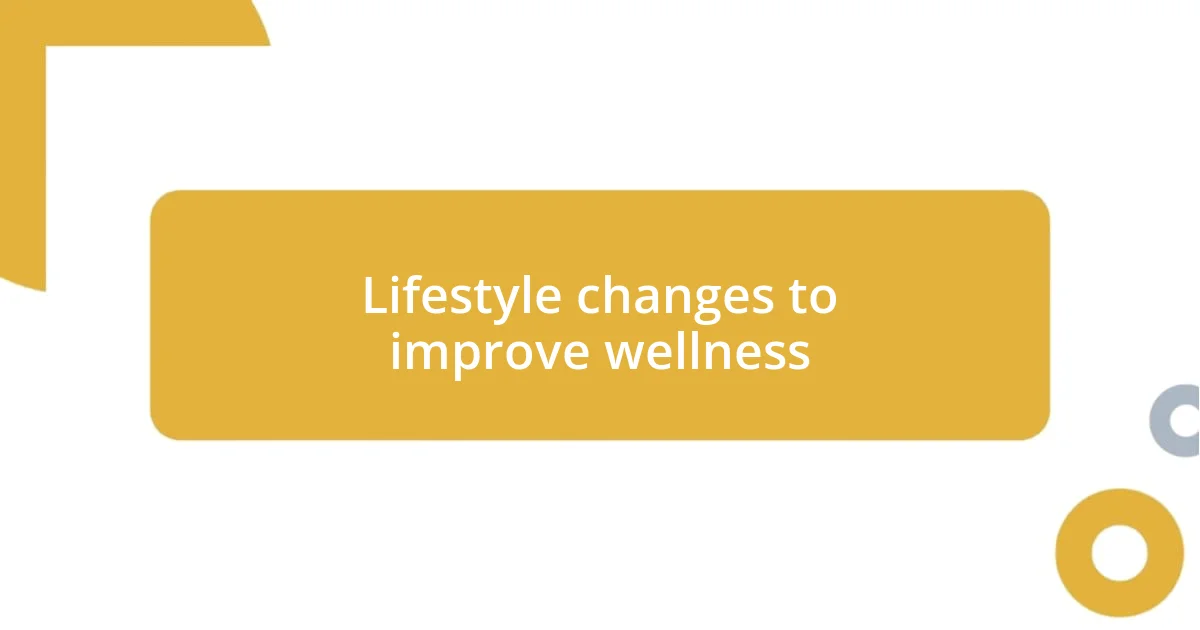
Lifestyle changes to improve wellness
Making lifestyle changes has been instrumental in improving my wellness. I began incorporating regular movement into my routine, setting realistic goals like a daily walk around my neighborhood. At first, it felt like an insurmountable task, but I discovered that just a few minutes of gentle stretching could enhance my mood significantly. Those small victories often made me wonder: how could something as simple as movement have such a profound impact on my overall well-being?
Nutrition also played a crucial role in my journey. I focused on making mindful dietary choices, opting for whole foods rich in vitamins and minerals. I vividly remember the day I swapped out my usual snack for a handful of nuts and fruits. The immediate rush of energy I experienced was nothing short of inspiring. Have you ever thought about how what we consume affects our energy levels and mood? Since then, I’ve recognized meal prep as a powerful tool—it helps me stay on track while making healthier choices more convenient.
Sleep hygiene became a non-negotiable aspect of my daily routine as well. I established a calming bedtime ritual to signal to my body that it was time to rest, which included dimming the lights and even practicing a few minutes of mindfulness meditation. After one particularly exhausting week, I finally committed to prioritizing sleep. The result was astonishing: I woke up feeling refreshed and ready to tackle the day. Isn’t it fascinating how giving our bodies the right kind of rest can amplify our capacity to cope? Embracing these lifestyle changes transformed my approach to wellness, allowing me to reclaim a sense of peace amidst the chaos.
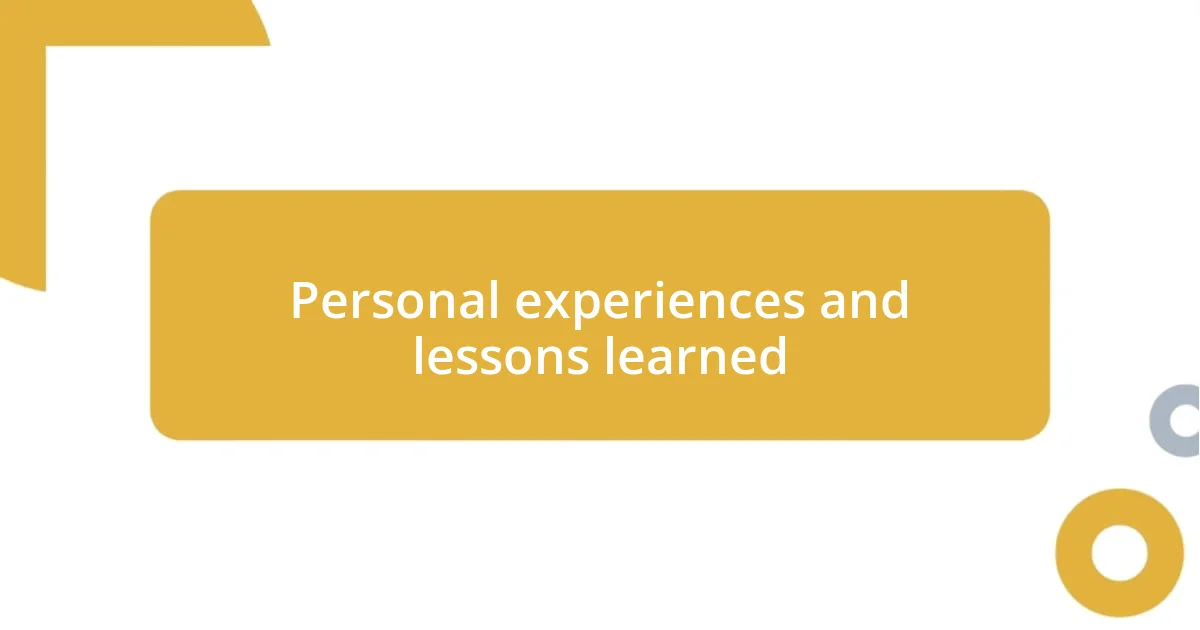
Personal experiences and lessons learned
Navigating the emotional landscape of post-viral syndromes has been a rollercoaster. I recall a day when the weight of fatigue felt unbearable, prompting me to sit quietly and reflect. In that moment, I realized that acknowledging my feelings wasn’t a sign of weakness but rather a courageous step toward healing. Have you ever found strength in simply sitting with your emotions? For me, accepting how I felt opened doors to conversations about my struggles, allowing me to connect with others who shared similar experiences.
One of the biggest lessons I learned was the importance of patience—not just with my recovery but with myself. On days when I struggled to accomplish even the simplest tasks, I often found myself grappling with frustration and self-doubt. However, I discovered that fostering a sense of compassion towards myself became a critical part of my healing process. Instead of chastising myself for not meeting expectations, I learned to celebrate my efforts, however small. It made me wonder: how often do we forget to acknowledge our own resilience?
I also encountered the transformative power of community support. I vividly remember joining an online support group where members shared their journeys. Hearing others’ stories made me feel less isolated; it was a profound relief to know I wasn’t alone in this fight. I often reflect on how vital it is to connect with those who understand our struggles—has a similar connection ever comforted you? Embracing that sense of community not only reinforced my journey but also provided new insights and encouragement to keep moving forward.







